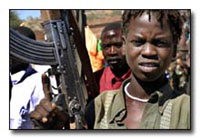Sudan: government and main rebels come to compromise
U.S. Deputy Secretary of State Robert Zoellick indicated two smaller rebel groups that rejected the treaty could be bypassed, and his assessment was bolstered when one of the two split Friday, with dissenters criticizing their leader for not embracing the proposed treaty.

"Today the largest group, Minni Minnawi's, has agreed to sign and the government of Sudan have agreed to sign as well," Zoellick told The Associated Press. "Not all the movements are in accord, but we're already getting phone calls that people with (rebel faction leader) Abdel Wahid (Nur) believe he has made a mistake."
Both the rebel and government sides have repeatedly failed to live up to agreements struck over two years of negotiations in the Nigerian capital. A cease-fire they signed in 2004 is in tatters.
Zoellick acknowledged implementing the agreement would be a challnge, but said he was looking ahead next to organizing a U.N. peacekeeping force for Darfur.
The Sudanese government initially rejected calls for U.N. peacekeepers to replace the thousands of African Union peacekeepers in Darfur now, but had indicated it would yield if a peace treaty was signed. Zoellick said there was strong backing for a U.N. force among the mediators in Nigeria.
The peace deal calls for a cease-fire; disarmament of militias linked to the government and accused of some of the war's worst atrocities; the integration of thousands of rebel fighters into Sudan's armed forces; and a protection force for civilians in the immediate aftermath of the war. Political provisions include guarantees rebel factions will have the majority in Darfur's three state legislatures, but the rebels did not get the national vice presidency they had sought.
Minnawi spokesman Saifaldin Haroun said the faction still had concerns about power sharing, but was no longer insisting Sudan have a vice president from Darfur. The other factions were believed to have rejected the agreement over security concerns, because it called for a top presidential adviser from Darfur instead of a vice president, and other issues, according to the AP.
The Nur faction walked out of negotiations in the Nigerian capital before dawn Friday, as had another rebel group, the Justice and Equality Movement.
After Zoellick's announcement Friday, one of Nur's top negotiators, Abdulrahman Moussa, said he was walking out on Nur to form his own Front for Liberation and Renaissance. He said was taking half Nur's camp with him and they supported the peace agreement.
He said because his group was new, it might not have status to formally sign the peace agreement, but that the African Union and the international community "will acknowledge our will for peace and then we will find a way to negotiate with the government."
Subscribe to Pravda.Ru Telegram channel, Facebook, RSS!





